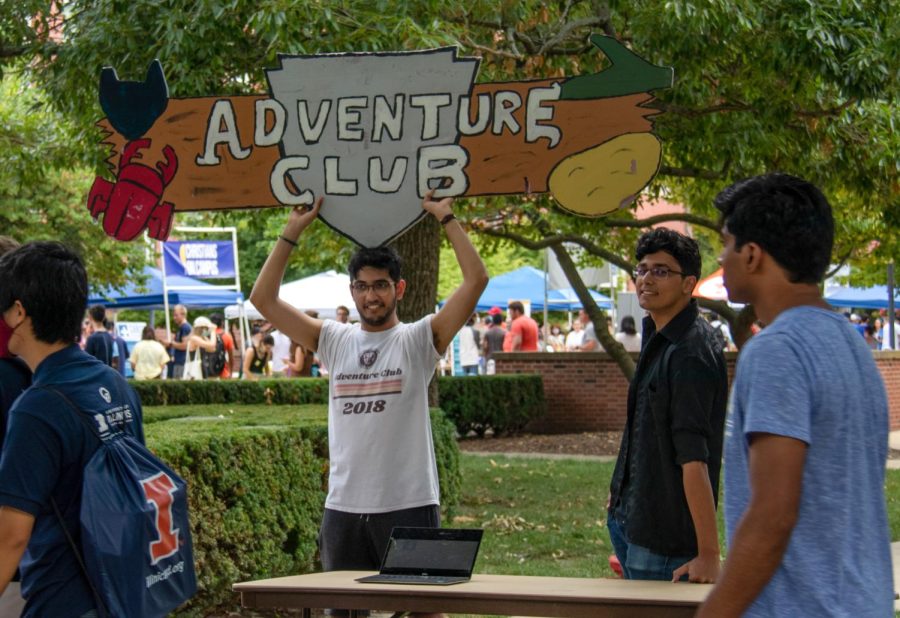RSOs reflect on challenges associated with online modality
The heavily social RSO, Adventure Club, promotes their group at Quad Day on Aug 22. Multiple RSOs reflect on the difficulty of working remotely during Covid-19.
Oct 20, 2021
Last updated on July 29, 2024 at 02:12 p.m.
With the reduction in past COVID-19 guidelines preventing in-person gatherings, many RSOs have transitioned to all in-person events.
The common nature of the in-person modality this semester starkly contrasts with the entirely remote events RSOs hosted last year. The Illinois Model United Nations, which is a pre-professional organization that simulates the events of the United Nations via general bodies and conferences, has returned to all in-person conferences across the nation following a year of remote conferences, according to Tina Wayne, a junior in LAS and the Secretary of Illinois MUN.
The in-person conferences, which are coming up this month, involve travel to places like Los Angeles, Washington D.C. and the Ivy Leagues to compete against other collegiate Model UN organizations.
Wayne has found that in-person events for Illinois Model UN are the most successful and preferable because remote formats don’t align with many of the crucial components involved, which include things like interpersonal communication, note passing and eye contact. Additionally, in-person events expose individuals to different forms of performance.
Get The Daily Illini in your inbox!
“You get to see different forms of leadership and different kinds of public speaking, which is something that you don’t get when you’re online,” Wayne said. “Your camera is off. You didn’t really have to speak because you spoke into a microphone. So I think it’s easier. But speaking in person — that’s completely different.”
Similarly, Halie Collins, a junior in Engineering and President of Illini Solar Decathlon, found that the online format made it extremely difficult for the RSO to function given its structure. Illini Solar Decathlon is a U.S. Department of Energy-sponsored student organization that builds and signs net-zero energy homes and other buildings.
“We are a design-based project, meaning that students have to actively work together and collaborate to come up with an innovative design,” Collins said. “And this was a challenge for all three of our different teams — we actually could not have a concept team last year because it was already so difficult — to build and design and be able to work together.”
Other RSOs also expressed similar sentiments about the way their RSO was not intended to function alongside an online modality. Adventure Club is a social RSO on campus with the primary objective of producing fun events like scavenger hunts, rap battle, slam poetry and giant Sorry! board games for members. Their mission had been obscured by the remote format due to the fact that online formats prioritize one speaker.
“Whoever’s the loudest person — whoever’s microphone is sensitive — their voice gets amplified over everyone else’s,” said Varun Sharma, a senior in Engineering and President of Adventure Club. “We’d be in a zoom call of 60 or 80 people, but we can have at most one conversation. So we lost a lot of team dynamics and a lot of opportunities to mingle and meet people and talk to people because you were always forced into one conversation.”
Shirley Li, junior in Business and Alpha Phi Omega Task Force Director, discovered that remote service opportunities were discouraging and resulted in members doing the minimum required rather than being willing to do more.
“But this semester is definitely different,” Li said. “I just feel like people are very pleasant where they are very willing to attend extra events (due to the in-person structure).”
While RSOs had ranging successes with the online format, all found that membership declined immensely when events were remote.
“The retention rate is very low for the previous semesters,” Li said. “But for this semester, we have 100 plus people pledging and I believe more people will remain in APO.”
Because of the difficulties associated with the online modality, RSOs have expressed that in person is the most effective modality.
“Our whole purpose is to meet people and meeting people is best when you go and talk to them,” Sharma said. “You can express things through facial expression, somatic action with your hands, which was lost in translation virtually.”
Collins expressed a similar sentiment about the connected nature of the in-person structure saturating the agendas of RSOs this semester.
“Being in person has not only broadened my perspectives of what sustainability is, learning from other people, but it’s also just made me more excited to be a part of (Illini Solar Decathlon), which is amazing,” Collins said.






